Distinctive Traits of Bird Pet Owners Explored
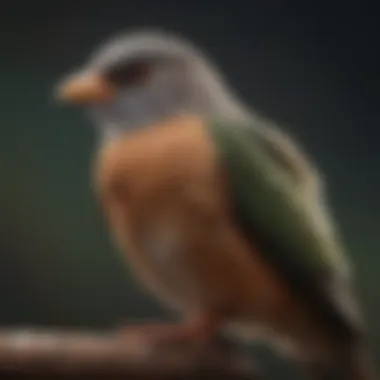
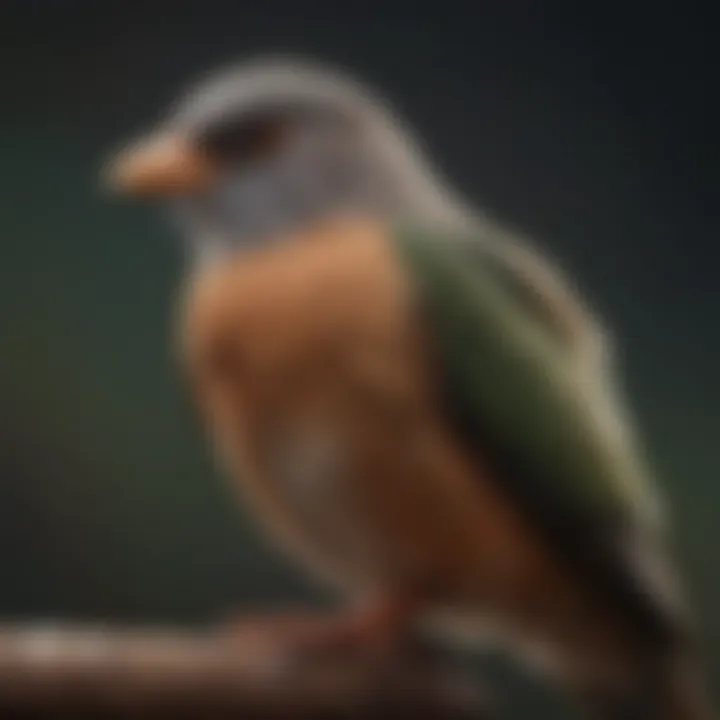
Intro
Many folks who choose birds as pets do so for unique reasons that differ from dog or cat enthusiasts. Bird owners often share a special bond with their feathered companions—one deeply rooted in understanding their needs and behaviors. As one embarks on this avian journey, it becomes crucial to grasp the distinctive traits that help define bird pet owners. In this article, we explore everything from fundamental care practices to the emotional ties that create lasting connections.
Bird owners aren’t just interested in having a pet; they invest time and energy fostering a relationship based on trust and companionship. They long to understand their birds’ quirks, prefer special diets, and create suitable habitats that mirror their natural environments.
By diving into avian care basics, social dynamics within the bird-keeping community, and insights regarding the emotional well-being of their pets, we aim to provide an all-encompassing overview of bird ownership. The journey of understanding these traits not only enriches the life of the pet bird but serves to strengthen the bond between humans and their avian companions.
As we progress, each section unfolds this fascinating world, revealing the nuanced characteristics that make bird pet owners truly unique. Let's take a closer look at what it takes to properly care for a bird and how this care reflects the identity of their owners.
Foreword to Bird Pet Ownership
Bird pet ownership opens a fascinating door into a world filled with vibrant colors, intricate behaviors, and unique emotional connections. From the joyful chirping of a parakeet to the graceful flight of a cockatoo, the first step to appreciation begins with understanding the motives and characteristics of those who choose to share their lives with these feathered companions. The decision to keep birds as pets is often laced with careful considerations, as potential owners must weigh numerous factors including space, time commitment, and the type of bird personality that best fits their lifestyle.
In this article, we explore what makes bird pet owners distinctive. Understanding these traits not only sheds light on the bond shared between humans and birds but also encourages better care practices and fosters emotional connections. Specifically, we will address how the diverse needs of birds shape the daily lives of their owners and consequently influence the community surrounding avian care. This exploration aims to enhance recognition of bird ownership as a rich and rewarding endeavor, illuminating the many ways in which these pets can enrich one’s life.
Defining Bird Pet Owners
Bird pet owners constitute a unique subset of pet enthusiasts whose passion thrives on understanding avian biology, behavior, and needs. They come from all walks of life and demonstrate an array of personalities, but what ties them together is a profound appreciation for their feathered friends. Bird owners can range from casual enthusiasts who enjoy the aesthetic appeal of a parrot’s vibrant plumage to dedicated breeders keenly aware of genetic lines and breeding ethics.
Defining this group delves into their motivations. Experimental evidence suggests that many bird owners are drawn to the quiet companionship offered by birds. Unlike traditional pets such as cats or dogs, birds elicit a different form of interaction—one that often requires patience and observance. Owners typically engage in gentle care routines, fostering a respectful relationship.
Moreover, the motivations behind bird ownership tend to vary widely. Some seek companionship that aligns with alternative lifestyles, where traditional pets just won't do, while others harbor dreams of forming a lifelong friendship with a talking bird.
The Appeal of Birds as Pets
The appeal of keeping birds as pets is not only rooted in their beauty and diversity but also in the many benefits these charming creatures provide. Considerable allure comes from the birds’ social nature, as many species are known to develop close attachments to their human caretakers.
- Vocal Communication: Many birds can be trained to mimic human speech, creating a delightful exchange that can forge a deep bond.
- Space Considerations: For those living in apartments or smaller homes, birds often require less space than dogs or cats, making them more manageable as pet choices.
- Low Maintenance: While they demand attention, many birds can be simpler to care for relative to more demanding pets, like certain dog breeds.
The vibrant behaviors and intelligence of birds offer endless entertainment. Owners often describe watching their birds as an engaging experience that can vary from bubbly antics to graceful soaring around the room. The relationship dynamic also appeals to many for its lighter, somewhat whimsical nature. The emotional exchanges mirror human connections, fostering a cozy environment that fills households with more than just songs; it bubbles with laughter and chatter.
As we continue through this exploration of bird ownership, keep in mind how understanding the unique characteristics of bird pet owners can reveal a world of devoted pet care and spirited community engagement.
"Birds are not only feathered companions; they hold keys to unlocking joy and unchanging loyalty, often unnoticed in the thicket of traditional pet preferences."
This discourse will unfold further into various dimensions of bird ownership—ranging from demographics to behavioral patterns—each layer revealing even more about those who have chosen to be bird pet owners.
Demographics of Bird Pet Owners
Understanding the demographics of bird pet owners is vital for numerous reasons. First and foremost, comprehension of age, gender, and geographic distribution can illuminate the diverse cultures and backgrounds that shape this engaging community. This demographic insight can aid in tailoring marketing efforts for pet products and services, ensuring they reach the right audience. Additionally, it enables bird breeders, veterinarians, and support groups to create targeted resources, enhancing care and fostering community ties.
The unique connections bird owners have with their pets often serve as a reflection of their social and psychological traits. By analyzing these demographics, it's possible to identify commonalities among various bird owners that may otherwise go unnoticed, thus enriching our understanding of the bond they share with their feathered companions.
Age and Gender Variations
When it comes to age and gender variations in bird ownership, a fascinating tableau unfolds. Bird keeping tends to attract a wide range of age groups, from young adults to seniors, each bringing their own perspectives and caregiving styles. Younger owners often relish the social media aspect of showcasing their birds, while older individuals may seek companionship and emotional comfort, finding joy in nurturing an avian friend.
Research indicates that,
- Younger bird owners (ages 18-35) often prefer smaller, more social parrots such as Budgerigars or Cockatiels. They view these pets not just as animals, but as part of their identity, often using platforms like Reddit or Instagram to share their experiences.
- Middle-aged and older owners tend to gravitate toward larger parrots that require deeper engagement and long-term dedication, such as African Grey or Macaw. This demographic places great emphasis on the interaction and emotional bonds they form with their birds.
Gender-wise, while there is no hard-and-fast rule on whether more men or women own pet birds, many studies show a slight skew towards females in terms of daily care and relationship attachment. Women** may often spend more time training and bonding with their birds, while men might engage more in aesthetic choices, like selecting elaborate cages.
Geographic Distribution
Geographic distribution among bird owners can also tell a compelling story. Owners are distributed across urban, suburban, and rural areas, each environment shaping pet care methods and preferences. For instance, urban bird owners might choose smaller species due to limited living space as opposed to those in rural areas who might have enough room for larger birds.
A few noteworthy points on geographic trends include:
- Urban areas often host a greater variety of pet bird species due to easy access to pet shops and specialized avian care resources. Cities may see more exotic birds, like Cockatoos or Lovebirds, which are in demand for their vibrant personalities and unique traits.
- Suburban owners generally opt for mid-sized birds, balancing space and care requirements. This may include species such as Parakeets or Conures, appealing due to their friendly demeanor.
- Rural owners often have experience with a wider array of bird species, sometimes even related to farming or conservation efforts. Partridges and pigeons may be common in these settings.
Geographic insights can consequently guide bird-related businesses in offering region-specific products and services, thereby supporting the unique needs of each type of owner.
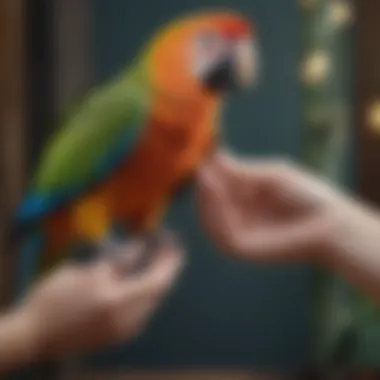
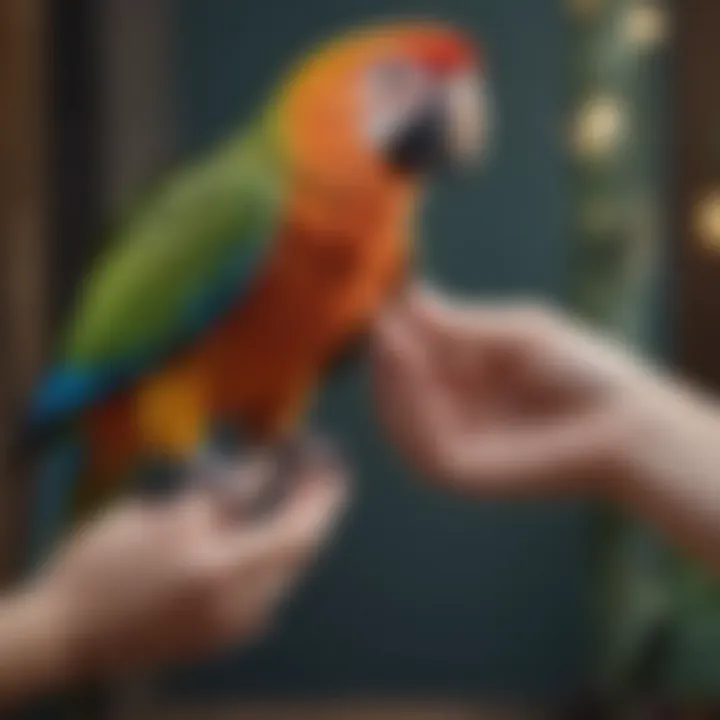
Understanding these demographic aspects adds a layer of depth to our overall view of bird pet ownership, shedding light on the myriad influences that define it.
Psychological Traits of Bird Owners
When discussing the nuances of pet ownership, bird enthusiasts frequently embody unique psychological profiles that distinguish them from other types of pet owners. These traits are not merely abstract concepts; they have real-world implications for the way bird owners interact with their pets and manage their welfare. Understanding these psychological traits is pivotal in recognizing the level of commitment and passion these individuals have towards their feathered friends. It sheds light on the special bond that exists between bird owners and their avian companions, as well as the benefits that arise from nurturing such relationships.
Patience and Attention to Detail
One of the most prominent psychological traits observed in bird owners is patience. Tending to birds often requires a slow and steady approach. Unlike dogs, who might respond quickly to training, birds may take a bit longer to acclimate or learn new tricks. Owners often find themselves repeating tasks with care, slowly building trust and understanding. This attribute is not just beneficial for their birds but also enhances the overall experience of pet ownership, allowing owners to appreciate the journey rather than just the destination.
Birds have complex social structures and behaviors that may not be immediately apparent. For instance, a bird's body language can communicate emotions such as fear, aggression, or comfort. Recognizing these signs requires an owner's keen attention to detail. Small cues like feather positioning can signify a bird’s mood or health status. A devoted bird owner might spend hours observing their pet, learning the various signals that indicate whether their feathery friend is feeling bubbly or blue.
"In the long run, a patient bird owner learns more about their pet than those who rush through the process."
Empathy and Emotional Connection
Another striking psychological trait of bird owners is their capacity for empathy. This trait fosters a deep emotional connection between them and their birds. Bird owners often view their pets as more than just animals; they see them as companions with unique personalities and needs.
The empathy displayed by these owners can lead to proactive management of their birds' mental and emotional well-being. For example, owners might recognize when their bird is feeling lonely or bored and respond by providing stimulating toys or social interaction. Birds are highly social creatures, and understanding their need for companionship is crucial for their happiness. An owner who genuinely empathizes with their pet is likely to create a nurturing environment that promotes vibrant health and joyful behavior.
Moreover, this emotional connection can extend beyond the day-to-day care. Many bird owners are active in communities that share insights about avian behavior and health. This not only strengthens their ties to the broader bird-owning community, but also reinforces their understanding of the specific needs of their kinds, enhancing their ability to provide excellent care.
Behavioral Patterns in Bird Ownership
Understanding the specific behavioral patterns in bird ownership is critical for comprehending the overall dynamics of this unique pet-keeping experience. Bird owners often engage in distinct routines and practices that are shaped by their deep emotional connections to their avian companions. Recognizing these behaviors can significantly enhance the care provided to birds, promote healthy interactions, and foster a supportive community among bird owners.
Social Interactions with Birds
Social interactions play a pivotal role in the lives of bird owners. Unlike many other pets, birds are highly social creatures that thrive on interaction, both with their human companions and with other birds. This need for social engagement significantly influences how owners behave in their daily lives.
- Conversational Habits: Bird owners may often find themselves talking to their pets, mimicking sounds, or even teaching them new words or phrases. This sort of engagement can be seen as an attempt to establish a bond, which many owners report enhances their own emotional well-being. It’s said that talking to birds can be a tool for mental health, providing comfort and companionship, especially for single owners. Notably, many birds develop impressive vocabularies and can engage in seemingly meaningful back-and-forth conversations.
- Cognitive Games: Many bird owners invest time in keeping their birds entertained. Puzzle toys, for instance, help in stimulating a bird’s mind. Owners often create games that encourage their birds to think critically, which is beneficial for the birds’ mental health and provides an avenue to display availability for interaction. This is not just a pastime; it fosters a deeper bond between the bird and its owner.
- Outings and Adventures: Bird owners frequently include their feathered friends in family activities, such as outings in parks or even shopping trips, where they might carry their birds in special harnesses. The act of sharing these experiences is notable; it emphasizes the extent to which bird owners value companionship and inclusion in their lives.
It’s important to highlight that each interaction can be as unique as the bond formed, revealing a spectrum of diverse approaches that owners might adopt based on their birds' species, behavioral traits, and individual personalities.
Daily Routines and Care Practices
Routine is a fundamental aspect of bird ownership. The way bird owners structure their day to ensure their avian companions are well taken care of speaks volumes about their commitment.
- Morning Rituals: Most bird owners have a set routine that starts in the morning. This ritual often includes uncovering the bird’s cage, offering fresh water and food, and allowing some social time before the day truly begins. For many, this peaceful morning routine becomes a cherished part of their daily life, a time when they can connect with their bird in a calm setting.
- Feeding Practices: Owners usually invest time in learning about proper avian nutrition, which often involves preparing a balanced diet that might include seeds, fruits, vegetables, and specially formulated pellets. This dedication goes beyond mere feeding; it represents a broader understanding of avian health and well-being that is vital for the birds’ longevity.
- Cleaning and Maintenance: Maintaining a clean habitat for birds is crucial as it helps prevent potential health issues. Bird owners generally engage in regular cleaning of cages, perches, and feeding accessories. This is not viewed merely as a chore; it’s part of ensuring a healthy environment that reflects a deep sense of responsibility.
- Time for Play and Exploration: Bird owners usually dedicate parts of their day to interacting with their birds outside their cages. This could be through supervised flight time or play sessions that encourage physical activity. The idea here centers on not just making sure that the birds are cared for, but actively engaging with them to promote a stimulating atmosphere.
These daily patterns reveal not only the care for the birds but also reflect the owners’ own behavioral traits; patience, dedication, and commitment to establishing a safe and nurturing environment for their feathered companions.
"The relationship between a bird and its owner is built on trust, communication, and routine—elements that bind their lives together.”
In summary, the behavioral patterns observed in bird ownership illustrate a profound emotional commitment and a unique lifestyle that is tailored to meet both the owners' and the birds' needs. By recognizing these distinctive traits, we can gain a better understanding of the intricate link between humans and their avian friends.
The Importance of Understanding Avian Needs
Understanding avian needs is crucial for bird pet owners. Unlike traditional pets such as cats or dogs, birds have unique physical and emotional requirements. Many bird owners often show a deep bond with their feathered companions, which naturally brings to light the importance of recognizing and catering to these specific needs. When we’re attentive to what our birds need, it leads to healthier, happier pets and a stronger connection between the bird and its owner.
First off, birds are a lot more than just pretty creatures perched in a cage. They have complex personalities, social structures, and dietary needs that, if neglected, can lead to serious health issues. Ignoring these intricacies not only affects the bird's well-being but also puts strain on the owner, who may experience guilt or frustration when their pet is unhappy.
"Caring for a bird isn't just about feeding; it's a commitment to learning about their unique worlds."
So, diving deep into understanding avian needs means making a commitment to quality care. This involves educating oneself about their nutritional needs and how to provide them with an enriching environment, which brings us to our next points.
Nutritional Awareness
When it comes to nutrition, birds often require a well-balanced diet that goes beyond the usual seed mixtures found in pet stores. Many owners may think that offering seeds alone is sufficient, but that’s just scratching the surface. A varied diet for most parrots, canaries, or finches should include fresh fruits, vegetables, and special pellets designed for avians. Birds, especially species like African Grey parrots or Cockatiels, will thrive on a diet rich in vitamins and minerals.
For example, dark, leafy greens such as kale or dandelion greens can provide important nutrients that keep feathers shiny and healthy. Similarly, incorporating fruits like berries or melons not only adds flavor but also hydration.
Some considerations for a well-rounded avian diet include:
- Avoid harmful foods: Certain foods like avocado or chocolate can be toxic to birds.
- Regular checks: Monitor food and water intake; make adjustments based on seasonal availability of fresh produce.
- Learning about species-specific needs: Different birds have unique diets—what works for a budgie might not suffice for a macaw.
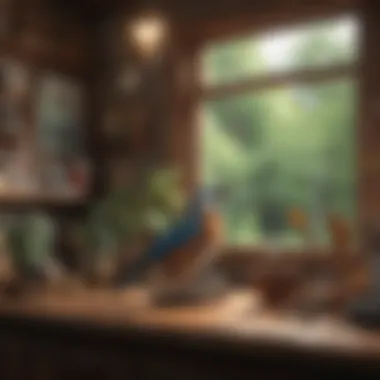
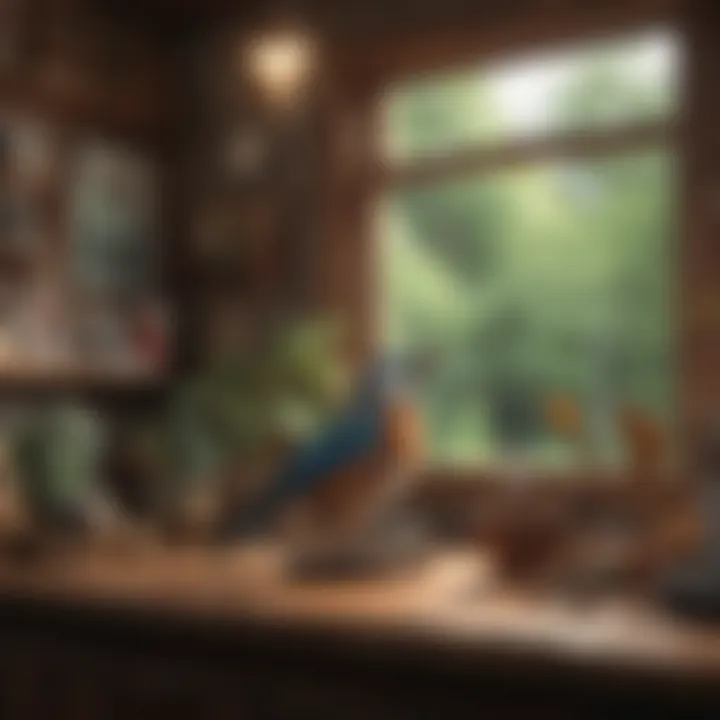
Recognizing these factors helps to build a strong foundation for a bird’s well-being uninterrupted by poor nutrition.
Environmental Enrichment Strategies
Creating an environment that stimulates and engages birds is as crucial as providing proper nutrition. Environmental enrichment refers to the activities, habitat enhancements, and interactions that enhance the bird's quality of life. Birds are highly intelligent creatures; without mental stimulation, they can become bored, leading to behavioral issues like feather plucking or excessive squawking.
There are various strategies to enrich a bird’s environment:
- Toys and interaction: Providing toys that encourage foraging, climbing, and chewing can keep birds actively engaged. Rotating toys regularly helps maintain their interest.
- Safe space for movement: Providing a spacious cage and allowing for supervised out-of-cage time is essential. Birds need room to stretch their wings and explore.
- Social interaction: Birds are social critters. Time spent talking or playing with them not only strengthens bonds but also provides mental stimulation.
- Natural elements: Incorporating branches, non-toxic plants, or even safe outdoor time in a controlled setting can mimic their natural habitat, which is beneficial for their mental health.
- Creating routines: Birds thrive on predictability. Establishing a daily routine can help them feel secure and engaged.
Community Engagement and Support Systems
Engaging within communities centered on bird ownership creates a supportive network that proves vital for many owners. Connecting with fellow enthusiasts, whether through online forums or local meetups, fosters a sense of camaraderie. These interactions offer a platform to share experiences, gather advice, and ensure the well-being of their feathery companions.
One of the major advantages of participating in avian communities is the wealth of information available at one’s fingertips. From health tips to behavioral advice, members often freely exchange knowledge. This kind of shared wisdom helps both new and seasoned owners navigate challenges that may arise, such as dietary concerns or potential health issues. When a person knows they are not alone in their struggles, it can greatly enhance their journey as a bird owner.
Moreover, being part of a community helps in finding resources such as grooming services, avian veterinarians, or suppliers for bird toys and food. Connecting with local owners often leads to discovering hidden gems in terms of specialized shops or services that cater specifically to birds, which might not be immediately apparent to those just starting out. This networking not only improves care for the birds but also enriches the owners’ lives.
A critical aspect of community engagement is the emotional support it provides. Bird ownership can be a deeply personal and sometimes stressful experience. Members can lend an ear and share coping strategies when problems arise, whether they’re dealing with a bird displaying unusual behavior or even the grief of losing a beloved pet. Just being able to talk about these experiences with others who truly understand can be a soothing avenue for many.
"The joy of having a bird isn't just in the companionship; it’s also in the friendships you forge with others who share your passion."
Participation in Avian Communities
Active participation in avian communities, whether online or offline, proves essential for bird owners. Online platforms like Reddit and Facebook host numerous groups specifically dedicated to bird care. These groups offer an accessible space for discussions ranging from bird training techniques to favorite brands of avian food. Members often post questions, seek recommendations, or simply share amusing stories about their pets, fostering a friendly and supportive environment.
Local bird clubs and events are another cornerstone for engagement. Meeting face-to-face with other bird lovers can lead to enduring friendships. Workshops or training sessions organized by these groups can enhance a bird owner's skills, whether it's improving their bird's socialization or learning proper feeding practices. Having a place to connect with others allows individuals to feel more secure in their roles as bird owners.
Networking with Other Bird Owners
Networking plays a significant role in enriching the experience of bird ownership. When owners link up with others in their community, they create avenues for sharing data and insights about caring for specific breeds or addressing common concerns. For example, a budgie owner might connect with another owner to discuss the effectiveness of particular toys or even share ideas for enriching their birds' habitats.
These interactions can also fill a gap when seeking expert advice. Often, bird owners can recommend knowledgeable veterinarians or trainers based on their personal experiences, which can save time and enhance the quality of care. Building these networks within the bird community opens doors to collaborative learning, giving owners access to various perspectives and practices that can inform their approach to bird care.
In summary, thriving within avian communities not only serves practical purposes, like sharing information and resources, but also bolsters emotional well-being. Building relationships with fellow owners can create a richer, more informed environment for both the birds and their caretakers.
Challenges Faced by Bird Owners
The journey of owning birds as pets is not all sunshine and rainbows. While the joy of sharing your life with a feathered friend is unparalleled, safeguarding their wellbeing can be a labyrinth of challenges. Addressing these challenges is crucial for several reasons. First, understanding the difficulties bird owners face can lead to better care practices and informed decision-making. Secondly, it nurtures a deeper empathic bond between the owner and the bird, enriching their relationship. Last but not the least, being aware of potential pitfalls can prevent heart-wrenching regrets in a bird owner's journey.
Unique Health Issues in Birds
Birds are often perceived as hardy creatures, but this view could not be further from the truth. They come with a specific set of health concerns that require vigilance and expertise from their owners. Feathers adorning the pupal form of your companion might seem indestructible, but they can be a telltale sign of underlying health issues.
Common health problems include:
- Psittacosis: A zoonotic disease that can transmit from birds to humans, often referred to as "parrot fever".
- Obesity: Due to sedentary lifestyles and improper diet, many pet birds can become overweight, leading to multiple health risks.
- Respiratory Problems: Their respiratory systems can be sensitive to environmental factors, including dust, smoke, and fumes from household items like candles.
- Feather Picking: This behavior frequently signals stress or illness, compelling owners to closely monitor their birds for other symptoms.
Being proactive in avian healthcare can make a world of difference. Regular veterinary check-ups, a nutritious diet, and providing a stress-free environment go a long way to keep your feathered friend healthy. The American Veterinary Medical Association (https://www.avma.org) emphasizes that finding an avian veterinary specialist is crucial.
Addressing Behavioral Problems
Birds have a rich tapestry of quirks and mannerisms, but behavior issues can surface, which may leave owners scratching their heads. Addressing these can be an intricate process, but it is significant to consider why these behaviors arise in the first place. A well-balanced emotional health impacts not just the individual bird but also the dynamic within the household.
Common behavioral challenges include:
- Screaming: This can be a natural sound for many species but it often indicates distress or boredom.
- Aggression: New owners may not understand that a bird's biting can emerge from fear or territorial instincts.
- Destructive Chewing: Parrots and other birds often chew, which is essential for their beak health. Excessive destructive behavior can signal that they need more stimulation or social interaction.
To tackle these issues, invest time in understanding their sociability needs. Engaging with them daily through training, interactive play, and mental stimulation can provide a balance that curbs unwanted behavior. Consistency in response is also vital. Bird owners must establish boundaries without resorting to harsh disciplinary measures.
Incorporating tools such as training schedules and behavior journals can help owners track changes and progress over time. Careful attention, coupled with educated care practices, can aid in navigating these behavioral complexities effectively.
"Understanding your bird is the first step to cherishing the bond you share. Treat each challenge not as a burden, but as an opportunity to grow together."
Navigating the challenges of bird ownership can feel overwhelming at times. A proactive stance on health and behavior not only ensures the wellbeing of your pet but fortifies the companionship you share. Just as birds are a reflection of their environment, so are their behaviors a mirror to their stability at home. Hence, a well-maintained habitat leads to a harmonious human-avian relationship.
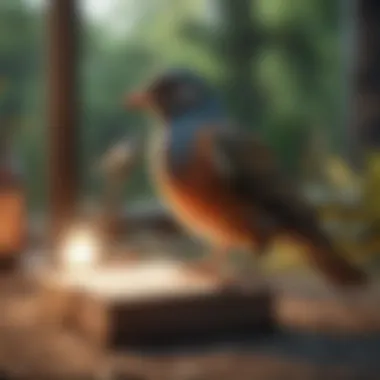
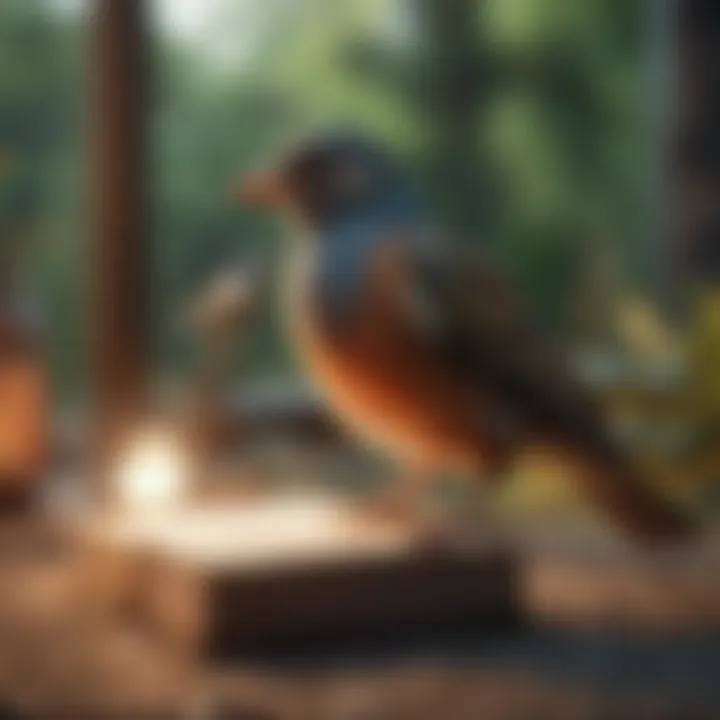
The Societal Perception of Bird Ownership
In today’s rapidly changing world, the perception of bird ownership is a topic that invites both curiosity and discussion. Unlike traditional pets such as dogs or cats, birds often warrant a distinct outlook due to their unique nature and the nuances involved in their care. Understanding this societal perspective is crucial as it influences not only how bird owners view themselves but also how they are regarded by the general public and other pet owners. This section aims to explore these perceptions along with their implications for bird lovers.
Comparisons with Other Pet Owners
Bird owners often find themselves navigating a different social landscape compared to those with more common pets. When compared to dog or cat owners, bird enthusiasts typically carry a blend of pride and defensiveness about their choice.
- Niche Interest: The community surrounding bird ownership is more niche. While the bond between a bird and its owner can be profound, a lack of understanding from those outside this world often results in diverse reactions. Some may see birds as mere decorations, while others may appreciate the complexities of avian companionship.
- Investment in Care: Bird owners frequently emphasize the commitment required in providing a suitable environment for their feathered friends. Things like specific diets, mental stimulation, and social interaction are often elevated in discussions. This contrasts with general pet care notions, which may not delve as deeply into behavioral needs and environmental factors as they do in avian circles.
The contrast extends to social platforms too. On Reddit, bird owners often share not only their triumphs but also the misconceptions they encounter. Conversations often tackle how to advocate for birds—not just as pets, but as living beings with specific needs.
Media Representation of Bird Owners
Media portrayals of pet owners can skew perceptions, occasionally leading to simplifications that don’t align with reality. Bird owners sometimes feel like they are misrepresented, often falling prey to stereotypes that overlook the profound connections they have with their birds.
- Documentaries and Shows: There are nature documentaries that do justice to the intricacies of avian life, yet everyday portrayals in sitcoms or movies might assert that bird ownership is merely a quirk without exploring the depth of commitment involved.
- Social Media: On platforms like Facebook, the vibrant community of bird owners often shares genuine moments that highlight the rewarding elements of this type of ownership—joyful interactions, clever behaviors, and even the challenges they face.
In contrast to the single-dimensional narratives often depicted, these personal accounts help shape a more nuanced understanding of bird ownership.
The societal perception of bird ownership, then, embodies a blend of fascination and misunderstanding. While many see bird owners as unique individuals with specialized interests, it’s the shared experiences—both joys and struggles—that ultimately forge a strong community among avian enthusiasts.
"A bond with a bird is more than just pet ownership; it’s a relationship that speaks to patience, care, and connection—elements that deserve recognition in society."
By unpacking these elements, we can better appreciate the unique landscape in which bird owners operate, encouraging a more informed respect that directly fosters community, support, and deeper understanding.
Future Trends in Bird Ownership
The world of bird pet ownership is ever-changing, reflecting broader societal trends and emerging needs of both avian companions and their human guardians. Recognizing these evolving dynamics is crucial, as they don’t just shape the experiences of bird owners, but also influence how birds are cared for and perceived in society. This section discusses notable trends that signify a shift in how bird ownership is viewed and practiced.
Increasing Interest in Exotic Birds
As the pet ownership landscape morphs, there's a marked uptick in the desire for exotic birds among enthusiasts. Captivating and vibrant feathered creatures like the African Grey Parrot or the Macaw captivate prospective bird owners not just with their looks but also with their engaging personalities. The burgeoning interest in these exotic species often stems from several factors:
- Social Media Influence: Platforms like Instagram and TikTok have become treasure troves of exotic bird content. Owners eagerly showcase their pet birds displaying unique tricks or engaging in playful behaviors, illustrating a vibrant lifestyle that many aspire to.
- Education and Awareness: The increased availability of information about the care and personality traits of exotic birds helps demystify ownership. Forums like Reddit and communities on Facebook allow potential owners to glean insights from seasoned bird enthusiasts.
- Desire for Connection: In a world where loneliness can often creep in, many find solace in forming a bond with a pet that is both intelligent and interactive. Exotic birds provide unique companionship, often engaging in dialogue and exhibiting affection toward their owners.
However, with this increased interest comes the responsibility of ensuring that these birds are housed properly and kept in environments conducive to their welfare. There’s a growing emphasis on understanding the natural habitats of these creatures and replicating that in the owners' homes. Therefore, potential owners must invest time in education before diving headfirst into exotic bird ownership.
Advancements in Avian Healthcare
The field of avian healthcare is experiencing revolutionary changes that promise to enhance the quality of life for pet birds. As more people adopt birds into their families, the demand for specialized care has soared, leading to advancements in both knowledge and technology:
- Preventive Measures: With a growing understanding of avian anatomy and psychology, preventive care has taken center stage. Regular check-ups and vaccinations can now catch potential health problems before they escalate, ensuring that birds lead long, healthy lives.
- Access to Specialists: The rise of avian veterinarians has made healthcare more accessible. Vet clinics now prioritize training on avian species, offering specialized treatment protocols tailored for various birds.
- Innovative Treatments: Advances in medicine for birds, such as laser therapy and improved surgical techniques, have dramatically improved the prognosis for many health-related issues that were often deemed fatal. This level of care empowers bird owners to better manage and understand their birds' health needs.
"Much like humans, birds require tailored care that recognizes their unique biology, behaviors and emotional requirements."
In summary, the future of bird ownership seems bright, with a greater emphasis on ethical practices and health awareness. As both exotic birds and their owners become more visible in the cultural narrative, there is a burgeoning understanding of the responsibilities that come with such companionship. Fostering these trends ensures a better future for avian pets and their human families alike.
Culmination
In wrapping up the various aspects surrounding bird pet ownership, it becomes evident that this topic holds significant relevance for the current ecosystem of pet care. Understanding bird pet owners and their unique traits isn't merely an academic pursuit; it’s pivotal for fostering a nurturing environment for both the birds and their owners.
The exploration has shed light on key areas such as the intricate behaviors, emotional connections, and the notable social interactions that define these individuals. Recognizing these elements offers insights into how avian enthusiasts approach their responsibilities and the bonds they form. Additionally, this understanding can pave the way for tailored support systems, enhancing the overall experience of bird ownership.
Moreover, current trends indicate a growing interest in avian companionship, underscoring the need for comprehensive knowledge and community connections. As more people take the leap into the world of bird ownership, it is vital to navigate the complexities involved. The benefits extend beyond the owners themselves; enriched bird care practices contribute positively to the well-being of the feathered companions.
Overall, as we stand at the intersection of personal care and community engagement, the journey of understanding bird ownership continues to unfold, inviting both deeper connections and higher standards of avian care.
Summary of Key Insights
Bird pet ownership comes with its own set of unique characteristics that separate it from other types of pet ownership. Here are the main takeaways:
- Emotional Bonds: Bird owners often form deep emotional connections with their pets, driven by the birds’ engaging behaviors and personalities.
- Social Dynamics: The interactions between owners and their birds are rich and complex, often involving playful exchanges that enhance the pet-owner relationship.
- Commitment to Care: Owners display a strong commitment to learning and meeting the specific needs of their birds, showcasing a unique blend of responsibility and compassion.
- Community Engagement: Participation in avian communities is a common trait. Owners often seek knowledge and share experiences, creating networks that provide both support and friendship.
These insights highlight the enriching journey of being a bird owner, emphasizing not only the responsibility but also the joy that these creatures bring into their lives.
The Ongoing Journey of Bird Ownership
The experience of bird ownership is not static; it evolves continually. Each new bird owner embarks on a journey filled with learning and adaptation. Here are some aspects of this ongoing voyage:
- Continuous Learning: As avian knowledge expands, owners find themselves constantly updating their approaches to care, feeding, and socialization.
- Adaptation to Change: Birds, much like any other pet, go through various life stages. Owners must adapt their care strategies to cater to changing needs, whether during the bird’s growth or in the face of health challenges.
- Community Development: Bird owners build communities that evolve over time. New members contribute fresh perspectives, while veteran owners share invaluable lessons learned through experience.
- Legacy of Care: As owners grow older, they often think about how their love for birds can influence the next generation. Many share their passion with family or even become mentors to new bird owners, ensuring the cycle of knowledge continues.
In summary, every bird owner charts a unique course filled with twists and turns. The journey is marked by personal growth, learning, and building connections that transcend beyond just caring for a pet.















